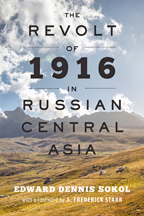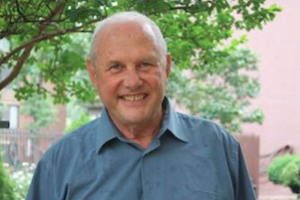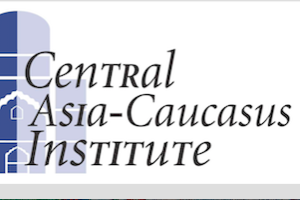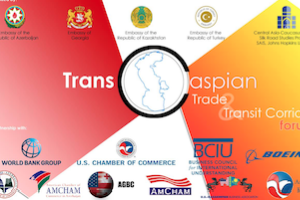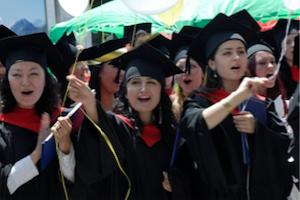Revolt in Central Asia: The Cataclysm of 1916
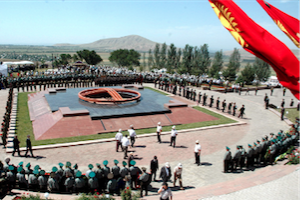
Revolt in Central Asia:
The Cataclysm of 1916
Wednesday, June 8, 2016, from 5 to 7 p.m.
(reception at 5 p.m., followed by the main program at 5:30)
A century ago, at the time of World War I, hundreds of thousands of Central Asians – Kazakhs, Tajiks, Turkmen, Uzbeks, and above all Kyrgyz – perished when they revolted against the tsarist Russian government's attempt to draft them into the army. Besides those who were killed outright, tens of thousands of Kyrgyz men, women, and children died trying to escape over treacherous mountain passes into China.
Soviet authorities have long suppressed Information on the 1916 revolt, but its Centennial has generated fresh interest, marked by seminars, mass meetings, and publications. Russia, in the meantime, has closed relevant archives and offered the curious thesis that the revolt was actually directed not against Russian rule, but against the authority wielded by the indigenous Turkic bourgeoisie.
The Central Asia-Caucasus Institute marks the centennial of the tragic loss of Central Asian life with two major publications: a new edition of the book The Revolt of 1916 in Russian Central Asia by Edward Dennis Sokol, with foreword by Dr. S. Frederick Starr (JHU Press); and a Silk Road Paper entitled Central Asia in Revolt: the Cataclysm of 1916, edited by Zamira Sydykova. Both of these publications will be presented and discussed at this forum.
This event can now be viewed on the SAIS Events YouTube channel.
Speakers will include:
Zamira Sydykova, Ambassador, Editor in Chief, Res Publica Newspaper
Dr. Prof. Mirzokhid Rakhimov, Visiting Fulbright scholar at Central Asia-Caucasus Institute/Head of the Dept. for Contemporary History and International Relations, Institute of History, Academy of Sciences, Uzbekistan.
Moderator: S. Frederick Starr, Chairman, Central Asia-Caucasus Institute.
Rome Building Auditorium
SAIS - Johns Hopkins University
1619 Massachusetts Ave., NW
Washington, DC 20036
Click here to RSVP and register
The Revolt of 1916 in Russian Central Asia
Edward Dennis Sokol, with a foreword by S. Frederick Starr
Paperback, 208 pages, 1 map
ISBN:9781421420509
May 2016
Follow this link to order a copy of the book
Lecture and Book Signing by Dr. S. Frederick Starr, “Lost Enlightenment: Central Asia's Golden Age from the Arab Conquest to Tamerlane”
*** Special Announcement from CACI ***
The Near East Section of the African and Middle Eastern Division
at the Library of Congress
AND
Roshan Institute for Persian Studies at the University of Maryland
Present:
“The Persian Book Lecture Series” 2016 Focus: Literature and Performing Arts
Lecture and Book Signing by
Dr. S. Frederick Starr, speaking on his book “Lost Enlightenment: Central Asia's Golden Age from the Arab Conquest to Tamerlane”
Thursday, May 5th, 2016
12:00 noon - 1:00 pm
Library of Congress, Thomas Jefferson Building,
African Middle Eastern Reading Room, LJ-220
10 First Street, S.E. Washington, D.C. 20003
Free and Open to the Public
For Information Contact: Hirad Dinavari [202-707-4518 or This email address is being protected from spambots. You need JavaScript enabled to view it.">This email address is being protected from spambots. You need JavaScript enabled to view it.]
Please allow time to clear security
Request ASL and ADA accommodation five days in advance at 202-707-6362 or This email address is being protected from spambots. You need JavaScript enabled to view it.">This email address is being protected from spambots. You need JavaScript enabled to view it.
Central Asia and the Caucasus: From Independence to Interdependence Presentations by Spring 2016 Rumsfeld Fellows
CACI FORUM
Central Asia and the Caucasus:
From Independence to Interdependence
Presentations by Spring 2016 Rumsfeld Fellows
Wednesday, 27 April, 2016, from 5 to 7 p.m.
(reception at 5 p.m., followed by the main program at 5:30)
The fall of the USSR enabled peoples of Central Asia and the Caucasus (Greater Central Asia) to claim full independence and sovereignty. While bringing many obvious benefits, the strengthening of new sovereignties has also brought self-isolation and rivalry among peoples who had actively interacted for hundreds of years before the Russian conquest. The resulting isolationism has created needless tensions in the region, deepened poverty, and fostered religious radicalization. Meanwhile, geographic proximity, interdependent infrastructure, and the presence of Russian media have maintained ties with Russia and rendered them appealing to many.
Is it time to shift from the radical independence to intra-regional dialogue and economic integration within the region? And for the region as a whole to capitalize on its strategic location, cultural diversity, and human capital?
Twelve participants of the Spring 2016 Rumsfeld Fellowship Program, representing nine countries of Central Asia and the Caucasus, will share their answers to these questions.
A video recording of the event may now be viewed on the SAIS Events YouTube channel.
Speakers:
Mr. Ozodkhon Davlatshoev (Tajikistan)
Mr. Nemuun Gal (Mongolia)
Mr. Emil Gasimli (Azerbaijan)
Mr. Sulkhan Glonti (Georgia)
Ms. Raykhona Khashimova (Uzbekistan)
Ms. Eliza Nishanbaeva (Kyrgyzstan)
Mr. Mahmood Noorzai (Afghanistan)
Mr. Rakhim Oshakbayev (Kazakhstan)
Ms. Lilit Petrosyan (Armenia)
Mr. Ruslan Ramanov (Uzbekistan)
Mr. Narantuguldur Saijrakh (Mongolia)
Mr. Barry Salaam (Afghanistan)
Moderator: S. Frederick Starr, Chairman, Central Asia-Caucasus Institute
SAIS - Johns Hopkins University
1619 Massachusetts Ave., NW
Washington, DC 20036
TRANSIT FORUM: Trans-Caspian East-West Trade and Transit Corridor
TRANSIT FORUM with the Embassies of Azerbaijan, Georgia, Kazakhstan, and Turkey
Thursday, 28 April, 2016, from 8 a.m. to 4 p.m.
The Central Asia, Caspian, South Caucasus and Black Sea regions together form a strategically important transit corridor between China and Europe. Connecting trade, people and economies, the modern trans-Caspian trade and transit routes from China to Europe, envisages an extensive and integrated network of infrastructure, special economic zones, harmonized customs, and cross-border procedures along this route.
Azerbaijan, Georgia, Kazakhstan and Turkey combined represent a market of more than 110 million consumers. These countries are able to offer customized and integrated solutions to companies with highly sophisticated supply chains.
Video of the forum can now be viewed on the SAIS Events YouTube channel.
On Thursday, April 28, 2016, the Embassies of Azerbaijan, Georgia, Kazakhstan, and Turkey to the U.S.A., are organizing the “Trans-Caspian East-West Trade and Transit Corridor” Forum in Washington, D.C., in partnership with the World Bank Group, U.S. Chamber of Commerce, Business Council for International Understanding, Boeing Company, U.S.-Azerbaijan Chamber of Commerce, AmCham Azerbaijan, America-Georgia Business Council, U.S.-Kazakhstan Business Association, AmCham Kazakhstan, AmCham Georgia, and Turkish-American Business Association/AmCham Turkey.
This special all-day forum, hosted by the Central Asia and Caucasus Institute at SAIS-Johns Hopkins University, will introduce projects and investments along the modern Silk Road to U.S. business leaders across a variety of multinational industries.
Speakers at this special forum include: Ambassador Elin Suleymanov, Azerbaijan; Ambassador Archil Gegeshidze, Georgia; Ambassador Kairat Umarov, Kazakhstan; Ambassador Serdar Kılıç, Turkey; Mr. Gary Litman, VP, US Chamber of Commerce; S. Frederick Starr, Chairman, Central Asia-Caucasus Institute, JHU-SAIS; Dr. Taleh Ziyadov, Director-General, Baku International Sea and Trade Port; Mr. Rauf Valiyev, Chairman, Azerbaijan Caspian Shipping; Mr. Mamuka Bakhtadze, CEO, Georgian Railways; Ms. Ketevan Salukvadze, Head of Transport Policy Dept., Ministry of Economy and Sustainable Development; Mr. Askar Mamin, President, Kazakhstan Railways; Mr. Sanzhar Yelubayev, President of KTZ Express; Mr. Osman Nuri Beyhan, Deputy Director General for EU and International Affairs, Ministry of Customs and Trade; and others TBA.
Schedule, Thursday, 28 April 2016:
8:00 - 9:00 a.m. Continental breakfast
9:00 - 10:00 a.m. Welcome by the Central Asia-Caucasus Institute, the US
Dept of State, Ambassadors of Azerbaijan, Georgia,
Kazakhstan, and Turkey, and representatives from the US
Chamber of Commerce
10:00 - 11:00 a.m. Panel #1: "Trans-South Caucasus Customs and Trade
Facilitation: What Needs to Be Done?"
Moderator: S. Frederick Starr
11:00 - 11:25 a.m. Q & A
11:25 - 11:40 a.m. Break (refreshments)
11:40 - 12:40 p.m. Panel #2: "'From Sea to Sea' Integrated Regional Transit
and Logistics Infrastructure."
Moderator: TBD
12:40 - 1:00 p.m. Q & A
1:00 - 2:00 p.m. Lunch served in the auditorium
2:00 - 3:00 p.m. Panel #3 "Commercial and Investment Opportunities:
Financing, Logistics, and Supply Chain."
Moderator: Jorg Frieden, Executive Director, The World
Bank Group
3:00 - 3:25 p.m. Q & A
3:25 - 4:00 p.m. Closing remarks
SAIS - Johns Hopkins University
1740 Massachusetts Ave., NW
Washington, DC 20036
Important Innovations in Higher Education: New Universities in the Caucasus, Central Asia, and Afghanistan
CACI Forum
Wednesday, Apr. 20, 2016, from 5 to 7 p.m.
(reception at 5 p.m. with Georgian wine, followed by the main program at 5:30)
New universities are rising cross Central Asia, Afghanistan, and the Caucasus, bringing innovations and jump-starting stalled processes of reform in higher education. This forum will focus on a number of these new initiatives, with authoritative presenters on several countries.
A recorded version of this event is available on the SAIS Events channel on YouTube:
Speakers:
S. Frederick Starr, Chairman, Central Asia-Caucasus Institute, JHU-SAIS
Shigeo Katsu, President, Nazarbayev University, Astana, Kazakhstan
Leslie Schweitzer, First Vice Chairman, Board of Trustees, American University of Afghanistan
Ellen Hurwitz, President Emerita, American University Central Asia (The Kyrgyz Republic)
Moderator: Mamuka Tsereteli, Research Director, Central Asia-Caucasus Institute
Rome Building Auditorium
SAIS - Johns Hopkins University
1619 Massachusetts Ave., NW
Washington, DC 20036
Click here to RSVP and register
